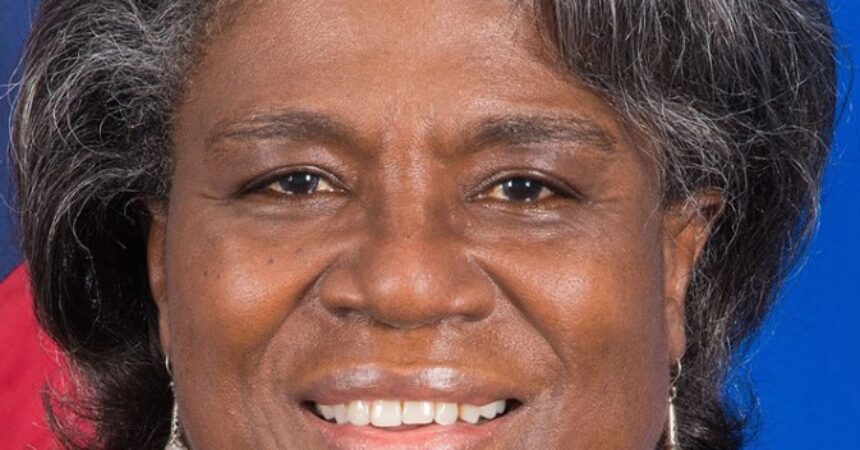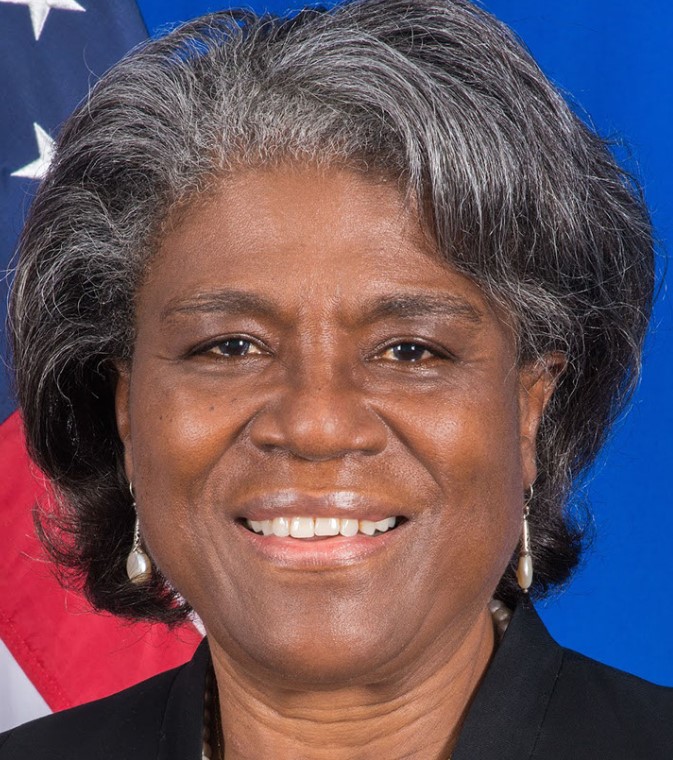
U. S. ambassador: Race issues make others think U.S. is ‘weak’

By Richard Prince
Special to the Trice Edney
News Wire from Journal-isms
In an echo of the Cold War and earlier eras, when adversaries capitalized on racial issues in the United States, Linda Thomas-Greenfield, the U.S. ambassador to the United Nations, said that when she is abroad, “We talk about issues of racial justice, and that is extremely important for me because it’s an issue where people think we are weak.”
Thomas-Greenfield was speaking last Thursday at a White House discussion among President Joe Biden’s six Black Cabinet appointees, staged in cooperation with The Grio for Black History Month.
Thomas-Greenfield continued, “And so they think they can criticize us on racial justice issues. And so I have been very, very clear. We do have issues. I can acknowledge those issues.
“The vast majority of other people don’t acknowledge their problems and I don’t think China would acknowledge that they have huge human rights violations taking place in China.
“I can acknowledge U.S. weaknesses but also talk about what we’ve done to accomplish dealing with those issues, including having us around the table,” she said, gesturing to the group.
Race relations in the United States have long been intertwined with international issues. During World War II, the Black press launched a “Double V campaign,” asking why African Americans, after fighting racism abroad, should face Jim Crow at home.
The “avowed Soviet commitment to racial equality and global anti-racism still had the power to inspire ordinary Black Americans in their struggle against Jim Crow and in their global pursuit of Black liberation,” reads one account of the Cold War.
During the Vietnam War, Muhammad Ali famously was quoted as saying, “No Vietnamese ever called me n—-,” even if he didn’t use exactly those words.
The tables were turned, however, after the George Floyd murder in the United States in 2020, when activists abroad were inspired to protest police abuse of Blacks in their own countries.
And perhaps most significantly, civil rights concerns played a large part in passing the 1965 immigration reform act, steering the nation’s demographics toward the multiculturalism that exists today. The law radically shifted U.S. policy away from selecting immigrants by national origin, favoring those from northwestern Europe and tightly restricting entry from Asia, Africa and the Caribbean.
Leading up to the change, a 1952 report from a Truman administration commission had cited liberal democratic creeds and the scientific rejection of racism, arguing that ethnically discriminatory immigration policies impaired U.S. foreign policy.
The Grio was chosen to stream the historic gathering, according to a White House spokeswoman, because “We look for every opportunity to partner with media outlets to ensure we’re reaching communities across the country.
“April Ryan is a longstanding White House correspondent and based on her consistent coverage of issues impacting the Black community, we thought it would be an excellent opportunity to partner for this historic convening.” Ryan, who joined the Grio in January 2021, celebrated 25 years as a White House correspondent last month.
Participating were Defense Secretary Lloyd Austin, Marcia Fudge, secretary of the Department of Housing and Urban Development, Michael Regan, Environmental Protection Agency administrator; Thomas-Greenfield; Shalanda Young, acting director of the Office of Management and Budget; Cecilia Rouse, who chairs the Council of Economic Advisers, and moderator Cedric Richmond, senior adviser to the president. Richmond said the number should really be seven, counting Vice President Kamala Harris, who is African American and Asian American.
Thomas-Greenfield said she carries four pillars of Biden’s policies when she is abroad: COVID, climate change, issues of racial inequities and racial justice, and economic recovery. They all are issues in which Americans’ fates are linked with those abroad, she said. “When I travel overseas, I always make sure that I am there to receive COVID vaccines that the United States is contributing, because we know that we cannot address this pandemic here in the United States if we don’t address the issues overseas.”
These Cabinet members’ Blackness differentiates them from other Cabinet members in several ways, they said. Citing the aphorism that Blacks have to be twice as good, Young said, “I hope I don’t have to give that speech” to her daughter. Speaking of her position, she said, “I want this to be normal for them, not something she sees as an exception to the rule.”
Regan, a native of Goldsboro, N.C., said “I’ve had to reach for an inhaler on a high-pollution day, Fudge said she would soon produce a report on bias in the housing appraisal process. Austin said he did not want to be the last African American secretary of defense and listed diversity and inclusion as high priorities. Richmond said he went to Morehouse College “because that’s where Dr. (Martin Luther) King went, and because it produced “strong Black men.”
Some spoke of the Southern towns where they grew up, the isolation of being the “only,” and the influence of their grandmothers.
Richmond asked each to name a public figure who had influenced them, though not all had a chance to answer:
Fudge named Barbara Jordan, legendary member of Congress from Texas known for her questioning during the Watergate scandal.
Rouse chose Dr. Ruth Simmons, first Black woman to lead an Ivy League college, Princeton. Simmons was part of a team that hired her.
Austin named Henry O. Flipper, the first African American to graduate from West Point, “a great role model” and native of his hometown, Thomasville, Ga.
Young cited Michelle Obama, “the epitome, who took a lot of flak for just being herself.”
The session was followed by a panel discussion on mental health and wellness in the Black community.







